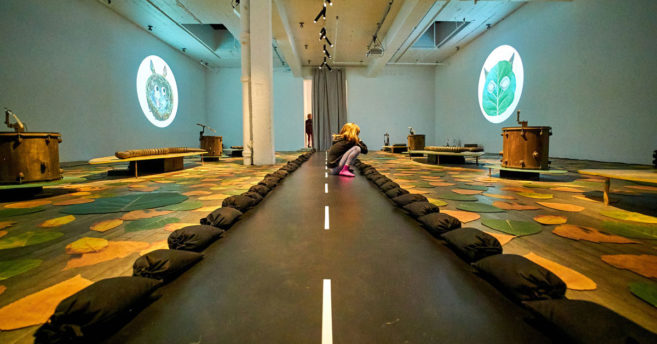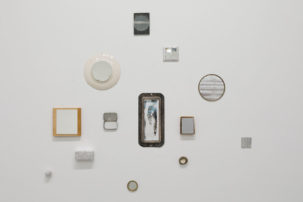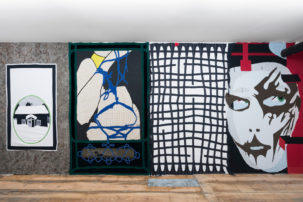Canadian artists have no shortage of fondness for modernist cinema. Stan Douglas has referenced Norman Foster and Orson Welles’ Journey into Fear and Tomás Gutiérrez Alea’s Memories of Underdevelopment; Rodney Graham has made work about Michelangelo Antonioni’s Zabriskie Point, and has been profoundly influenced by silent-film masters Buster Keaton and Charlie Chaplin. Recent Grange Prize winner Kristan Horton’s photographic epic Dr. Strangelove Dr. Strangelove reconstructs shots from the Stanley Kubrick film using items from his studio. Hadley + Maxwell’s 1 + 1 – 1 turns Jean-Luc Godard’s 1968 film about the Rolling Stones into an absurdist installation. And currently, senior Toronto artist John Massey takes on Godard’s Contempt with a new series of photos entitled After Le Mépris at Georgia Scherman Projects.
Underlying all these efforts is a sincere fascination with a moment in film history that, while relatively recent, is, in both technological and cultural terms, long past. The case of Contempt is particular. Godard’s troubled foray into commercial work and, against or perhaps because of these odds, his inarguable masterpiece, the film has become an art-house Holy Grail. Based on Albert Moravia’s novel of romantic disintegration Il disprezzo, but significantly adapted by Godard, the film marks a collision of mythic personae and moments: the lush production values of Technicolor and Cinemascope, used by a director torn between deconstructing and celebrating them; the luminous presence of Brigitte Bardot, presented with equal conflict; the electric casting of Jack Palance as producer and Fritz Lang as director of a film-within-the-film; said film-within-the-film taking as its subject Homer’s The Odyssey, with overwhelming, Joycean overtones about the classical universe’s lingering sway on modernity. One could go on and on.
| <img src="/online/reviews/2010/11/03/johnmassey_img2.jpg" alt="John Massey Golden Eye 2010 Courtesy Georgia Scherman Projects” style=”border: none; clear: both;” /> | |
|
John Massey Golden Eye 2010 Courtesy Georgia Scherman Projects |
Into this hall of mirrors enters John Massey, an artist who has never shied away from high-period modernism or its replications. (Indeed, his father, Hart Massey, designed John’s childhood home in the manner of Mies van der Rohe, an advent that became the subject of his 2004 series Phantoms of the Modern.) There could be no better title for the new works than After Le Mépris. Not only has Massey gone to great lengths to reconstruct, as a pristine white maquette, Michel Piccoli and Bardot’s apartment—the setting for the film’s centrepiece, a devastating, protracted row between the two spouses—but he seems comfortable working within the looming shadow of this and other modern masterpieces.
The best qualities of the photographs—which show various digital manipulations of the maquette—concern this divergence between the glorious past and the debased present, one with which Godard himself grappled. Massey’s previous show, a gorgeous collection of photos of car interiors whose forms echoed Tom Thompson paintings, was a prelude; here, we see an even more intent focus on absence, emphasizing modernism’s eventual swallowing of the human. All photos emphasize the white of the maquette, with accents of primary colours, and feature items that Bardot’s and Piccoli’s characters cast off during their argument. One image shows bubbles floating in the room, which reflect, down to the last detail, the scale of the scene’s setting—a dry exercise, yes, but admirably precise. Following in the tradition of minimalism, modernism’s last emperor, it is Massey’s formal study of vacancy.
The bubbles also recall modernism’s lighter side, surrealism, which gives Massey’s studies their strength. Cloud Nine, with its pile of pillows mimicking cumulus clouds in a background window, and Blues, with its trickle of water running next to a gilded mirror, suggest Magritte; Red Curtain, with its red vase and yellow flowers, suggests De Chirico. Massey goes further: Bitch’s Brew, with its floating red and yellow towels over a floor that he covers in water, is kitschier, and could be an advertisement for Cheer laundry detergent. Godard himself would not have frowned at such tawdry allusions, but it is vital to note that he managed to squeeze them all into his formidable, inimitable imprimatur. Massey hasn’t done the same, but his work is calmly and exquisitely informed. Almost 50 years after Contempt, it is, perhaps, the best a nostalgic modernist can muster.
| <img src="/online/reviews/2010/11/03/johnmassey_img3.jpg" alt="John Massey Red Curtain 2010 Courtesy Georgia Scherman Projects” style=”border: none; clear: both;” /> | |
|
John Massey Red Curtain 2010 Courtesy Georgia Scherman Projects |










